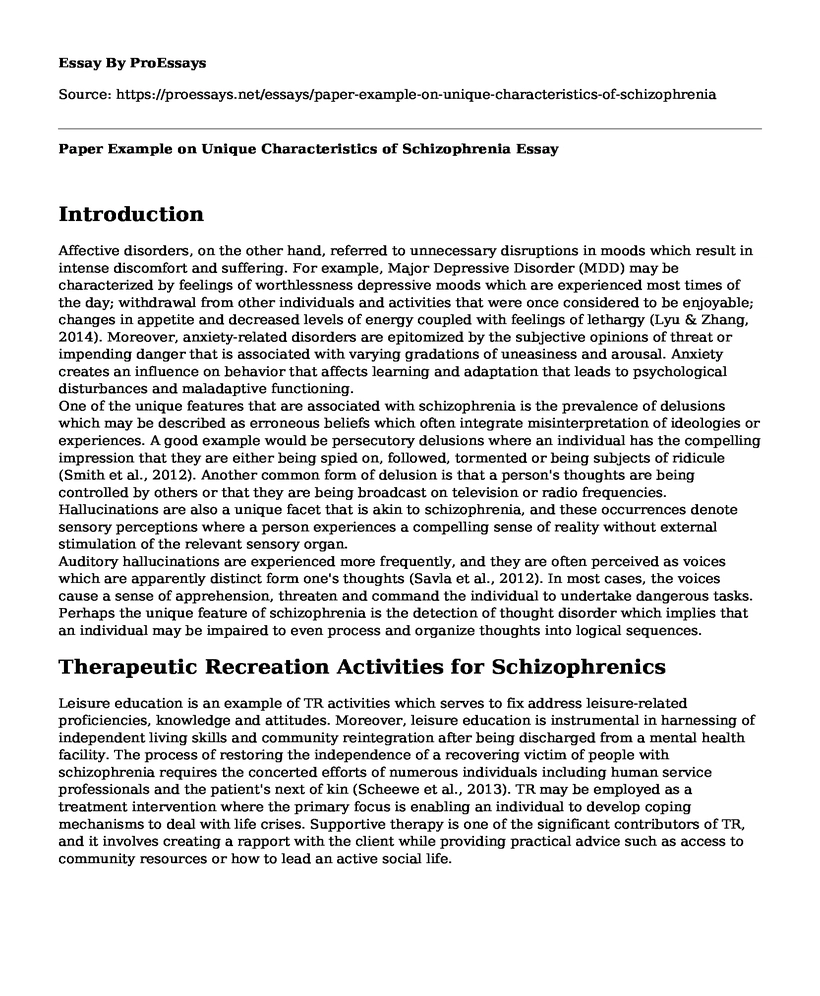Introduction
Affective disorders, on the other hand, referred to unnecessary disruptions in moods which result in intense discomfort and suffering. For example, Major Depressive Disorder (MDD) may be characterized by feelings of worthlessness depressive moods which are experienced most times of the day; withdrawal from other individuals and activities that were once considered to be enjoyable; changes in appetite and decreased levels of energy coupled with feelings of lethargy (Lyu & Zhang, 2014). Moreover, anxiety-related disorders are epitomized by the subjective opinions of threat or impending danger that is associated with varying gradations of uneasiness and arousal. Anxiety creates an influence on behavior that affects learning and adaptation that leads to psychological disturbances and maladaptive functioning.
One of the unique features that are associated with schizophrenia is the prevalence of delusions which may be described as erroneous beliefs which often integrate misinterpretation of ideologies or experiences. A good example would be persecutory delusions where an individual has the compelling impression that they are either being spied on, followed, tormented or being subjects of ridicule (Smith et al., 2012). Another common form of delusion is that a person's thoughts are being controlled by others or that they are being broadcast on television or radio frequencies. Hallucinations are also a unique facet that is akin to schizophrenia, and these occurrences denote sensory perceptions where a person experiences a compelling sense of reality without external stimulation of the relevant sensory organ.
Auditory hallucinations are experienced more frequently, and they are often perceived as voices which are apparently distinct form one's thoughts (Savla et al., 2012). In most cases, the voices cause a sense of apprehension, threaten and command the individual to undertake dangerous tasks. Perhaps the unique feature of schizophrenia is the detection of thought disorder which implies that an individual may be impaired to even process and organize thoughts into logical sequences.
Therapeutic Recreation Activities for Schizophrenics
Leisure education is an example of TR activities which serves to fix address leisure-related proficiencies, knowledge and attitudes. Moreover, leisure education is instrumental in harnessing of independent living skills and community reintegration after being discharged from a mental health facility. The process of restoring the independence of a recovering victim of people with schizophrenia requires the concerted efforts of numerous individuals including human service professionals and the patient's next of kin (Scheewe et al., 2013). TR may be employed as a treatment intervention where the primary focus is enabling an individual to develop coping mechanisms to deal with life crises. Supportive therapy is one of the significant contributors of TR, and it involves creating a rapport with the client while providing practical advice such as access to community resources or how to lead an active social life.
Desired Outcomes from TR Interventions
One of TR's interventions integrates the use of individual psychotherapy where the client is subjected to scheduled talks with qualified mental health professionals. Additionally, these talks are aimed at correcting the distorted perceptions concerning themselves and others. The objective of TR would be to eliminate the feelings of estrangement, reduce perceptions of isolation, improve social functioning and avoid psychotic relapses (Snethen, McCormick & Van Puymbroeck, 2012). The involvement of a client's next of kin in family therapy is instrumental as it assists in collecting background information about the person with schizophrenia; assess the impact of the illness on other family members and educate family members on the tenets of the illness and how they may be of assistance to the client. In essence, evidence-based practices indicate that family therapy is crucial in the reduction of relapses on the part of the client.
References
Lyu, J., & Zhang, J. (2014). Characteristics of Schizophrenia Suicides Compared with Suicides by other Diagnosed Psychiatric Disorders and those without a Psychiatric Disorder. Schizophrenia Research, 155(1), 59-65.
Smith, M. J., Horan, W. P., Karpouzian, T. M., Abram, S. V., Cobia, D. J., & Csernansky, J. G. (2012). Self-reported Empathy Deficits are uniquely associated with Poor Functioning in Schizophrenia. Schizophrenia research, 137(1), 196-202.
Savla, G. N., Vella, L., Armstrong, C. C., Penn, D. L., & Twamley, E. W. (2012). Deficits in Domains of Social Cognition in Schizophrenia: A Meta-analysis of the Empirical Evidence. Schizophrenia Bulletin, 39(5), 979-992.
Scheewe, T. W., Backx, F. J. G., Takken, T., Jorg, F., Strater, A. V., Kroes, A. G., ... & Cahn, W. (2013). Exercise Therapy Improves Mental and Physical Health in Schizophrenia: A Randomised Controlled Trial. Acta Psychiatrica Scandinavica, 127(6), 464-473.
Snethen, G., McCormick, B. P., & Van Puymbroeck, M. (2012). Community Involvement, Planning and Coping Skills: Pilot Outcomes of a Recreational-Therapy Intervention for Adults with Schizophrenia. Disability and Rehabilitation, 34(18), 1575-1584.
Cite this page
Paper Example on Unique Characteristics of Schizophrenia. (2022, Mar 26). Retrieved from https://proessays.net/essays/paper-example-on-unique-characteristics-of-schizophrenia
If you are the original author of this essay and no longer wish to have it published on the ProEssays website, please click below to request its removal:
- The Use of IoT and Technology in E-mental Health: Literature Review
- Research Paper on Relational Aggression
- Essay Sample on Aging Population: Impacts, Challenges and Opportunities
- Essay Sample on Psychology: A New Science Explored
- Paper Example on Discovering Value Within to Achieve Happiness
- Essay Example on the Changing Landscape of Love: From Sacred Institution to Modern Society
- Romantic Story: Rush - Free Paper Sample







